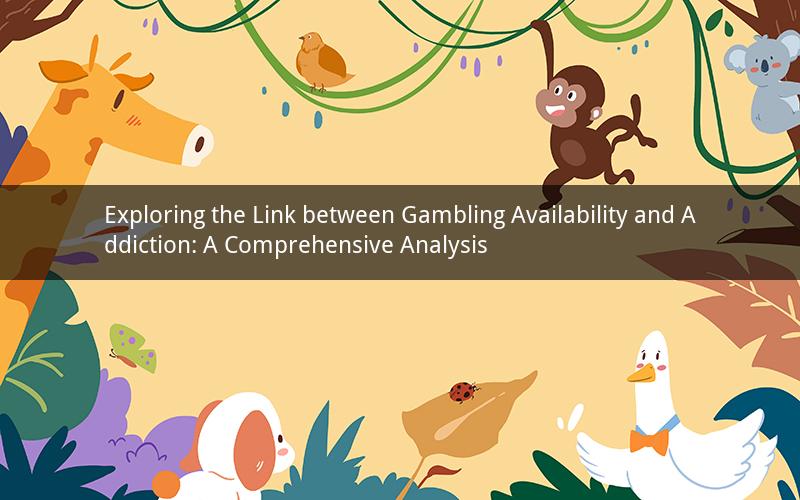
Introduction:
The availability of gambling has significantly increased in recent years, with the rise of online platforms and the expansion of land-based casinos. This surge in accessibility has sparked a heated debate on whether there is a correlation between the availability of gambling and addiction. This article delves into the existing research, examines various perspectives, and provides insights into the potential link between the two.
1. The Growing Availability of Gambling:
In the past few decades, the gambling industry has witnessed remarkable growth, both in terms of physical locations and online platforms. The proliferation of online casinos, sports betting websites, and mobile applications has made gambling more accessible than ever before. This increased availability has raised concerns about the potential impact on individuals' gambling habits and addiction rates.
2. The Concept of Gambling Addiction:
Gambling addiction, also known as problem gambling or compulsive gambling, is characterized by an uncontrollable urge to gamble, despite negative consequences. Individuals with gambling addiction may experience financial, emotional, and social repercussions. The addiction often progresses to severe levels, leading to devastating outcomes.
3. The Correlation between Availability and Addiction:
Numerous studies have explored the relationship between the availability of gambling and addiction rates. While some research suggests a correlation, others argue that the relationship is more complex and multifaceted.
a. The Availability-Addiction Hypothesis:
The availability-addiction hypothesis posits that increased access to gambling opportunities leads to higher rates of addiction. Proponents of this theory argue that the more easily accessible gambling is, the more likely individuals are to develop problematic gambling behaviors. This hypothesis is supported by studies showing that regions with higher levels of gambling availability tend to have higher rates of problem gambling.
b. The Vulnerability-Selection Hypothesis:
The vulnerability-selection hypothesis suggests that individuals who are predisposed to gambling addiction are more likely to seek out gambling opportunities. In this view, the availability of gambling merely serves as a facilitator for those who are already vulnerable to addiction. This theory emphasizes the role of individual factors, such as personality traits and mental health issues, in the development of gambling addiction.
4. Factors Influencing the Availability-Addiction Link:
Several factors can influence the strength of the relationship between gambling availability and addiction rates:
a. Population Demographics:
The demographic characteristics of a population, such as age, gender, and socioeconomic status, can play a role in the availability-addiction link. For instance, studies have shown that younger individuals and those with lower socioeconomic status may be more susceptible to the allure of gambling.
b. Social and Cultural Influences:
Cultural attitudes towards gambling, as well as the normalization of gambling activities in society, can contribute to the availability-addiction link. When gambling is widely accepted and celebrated, individuals may be more likely to engage in risky gambling behaviors.
c. Regulatory Measures:
The effectiveness of gambling regulations and policies can also impact the availability-addiction link. Strict regulations and monitoring can help mitigate the risks associated with gambling addiction, while lenient regulations may exacerbate the problem.
5. Potential Solutions and Recommendations:
Addressing the potential link between gambling availability and addiction requires a multifaceted approach. Here are some recommendations:
a. Strengthening Regulatory Measures:
Governments should implement stricter regulations and oversight to ensure responsible gambling practices. This includes monitoring gambling operators, enforcing age restrictions, and providing resources for problem gamblers.
b. Promoting Education and Awareness:
Public awareness campaigns should be conducted to educate individuals about the risks associated with gambling and the signs of addiction. By increasing awareness, individuals can seek help before their gambling habits become problematic.
c. Providing Support and Treatment:
Accessible and effective treatment options should be made available for individuals struggling with gambling addiction. This includes counseling, therapy, and support groups to help individuals overcome their addiction and rebuild their lives.
6. Conclusion:
The relationship between the availability of gambling and addiction is a complex and multifaceted issue. While some research suggests a correlation, it is essential to consider the various factors that contribute to gambling addiction. By implementing robust regulatory measures, promoting education and awareness, and providing adequate support and treatment, society can address the potential risks associated with gambling availability and addiction.
Questions and Answers:
1. Q: Is there a direct cause-and-effect relationship between gambling availability and addiction?
A: No, there is no direct cause-and-effect relationship. The relationship is complex and influenced by various factors, including individual vulnerabilities and societal contexts.
2. Q: Can the availability of gambling be completely eliminated to prevent addiction?
A: While it is difficult to eliminate gambling altogether, implementing strict regulations and oversight can help mitigate the risks associated with gambling addiction.
3. Q: Are there any genetic factors that contribute to gambling addiction?
A: Yes, some research suggests that genetic factors may play a role in the development of gambling addiction. However, environmental and social factors also contribute significantly.
4. Q: Can online gambling be as addictive as traditional land-based gambling?
A: Yes, online gambling can be equally addictive as traditional land-based gambling. The convenience and accessibility of online platforms may even exacerbate the risk of addiction.
5. Q: What can individuals do to protect themselves from developing a gambling addiction?
A: Individuals can take several steps to protect themselves from developing a gambling addiction, such as setting limits on gambling activities, seeking support from friends and family, and being aware of the signs of addiction.